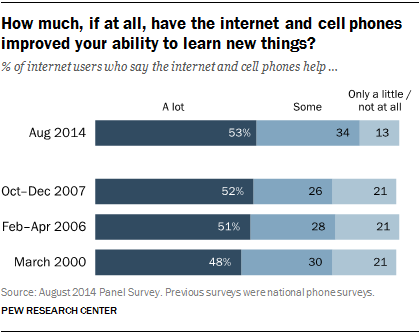![]() In a break from gloom and dystopia, most Americans now view the internet as a positive force in their lives, according to a new Pew survey. The results contrast neatly with the steady drumbeat of fearsome digital media stories.
In a break from gloom and dystopia, most Americans now view the internet as a positive force in their lives, according to a new Pew survey. The results contrast neatly with the steady drumbeat of fearsome digital media stories.
For example, a clear majority of Americans do not worry about information overload. “72% of internet users report they like having so much information, while just 26% say they feel overloaded.”*
Similar majorities enjoy:
- “their ability to learn new things”
- “improv[ing] their ability to share their ideas and creations with others”
- being “better informed about products and services available for sale, national and international news, and popular culture”
- being “better informed about friends than they were five years ago, and 60% feel they know more about family.”
This appreciation has grown over time. We’re happier than we used to be about the internet:
Our delight is not just personal, but also social:
76% of online adults say access to the internet has made average Americans better informed, while just 8% saying it has made them less well-informed… 77% of adult internet users say the internet has made today’s students better informed, with just 8% saying it has made them less well-informed [emphases in original]
Note that these are not utopian but incremental claims, just statements of belief that things are getting better.
Age remains a strong attitude divider:
Among today’s web users, those under age 50 are more likely than internet users age 50 and older (61% v. 44%) to feel the internet and cell phones have improved their ability to learn new things “a lot.” The oldest internet users (ages 65 or older) are the least likely to perceive an impact in this area, with 19% saying the internet and cell phones have improved their ability to learn new things “only a little” or “not at all.”
So does class and education.
Interestingly, we tend to see the internet as connecting us more to the world than to out localities:
Of the 12 topics in our survey, the highest percentage of respondents say the internet has made them better informed about products and services to purchase, with 81% of internet users saying they know more than they did in this area five years ago. This is followed by national news (75%), international news (74%) and pop culture (72%).
buy albuterol online buy albuterol no prescription genericBy comparison, about half as many internet users say the internet has made them better informed about their neighborhood and neighbors (39%).
buy orlistat online buy orlistat no prescription generic
Perhaps this survey will change the attitudes of some internet critics, who prefer to target Silicon Valley evangelists. Now naysayers will have to deal with the majority of online Americans.
Perhaps each will see the other as deluded.
*Some interesting details on information overload perceptions:
Women are slightly more likely than men to report feeling overwhelmed (30% v. 21%), as are internet users ages 50 and older when compared with those ages 18-49 (30% v. 22%)






I sometimes feel like a real anomaly: I’m 64 (that older age group) who has enthusiastically embraced the digital age, and I rarely if ever feel overwhelmed; however, as a Faculty Tech Specialist, I can attest that my older faculty, men and women both, tend to have tech skills they struggle with; therefore, they don’t practice them enough for those skills to become unconscious and to truly help them. Overwhelm comes from constantly fighting the battle to learn and never really progressing…maybe I should write a blog post about this!
You should, Sandy.
I love and respect you anomalies, and thought there’d be more of you guys by now. Maybe soon.